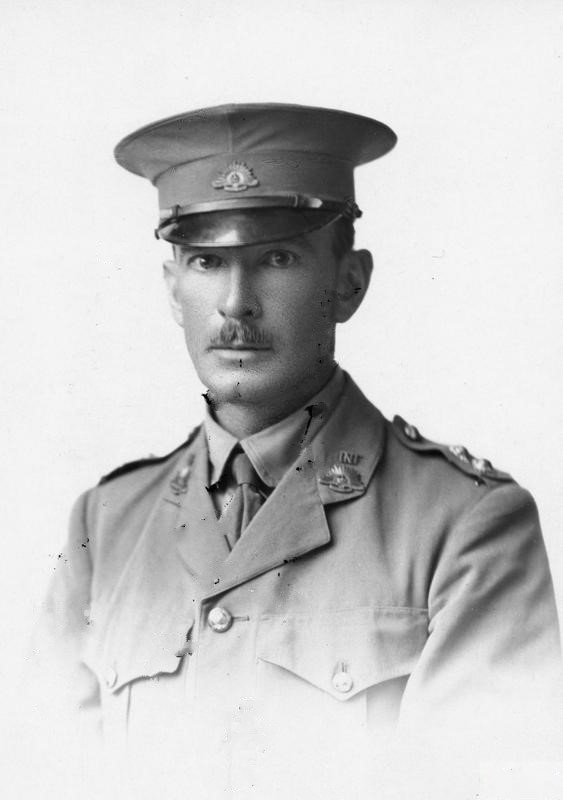MACRAE Norman Farquar
Captain Norman Farquar Macrae

.
Son of John Kenneth Macrae and his wife Elizabeth Dunbar; husband of A. M. A. Macrae, of “Dunbar”, Katanning, Western Australia. Born in Scotland. Farmer and grazier of ‘Dunbar’, East of Katanning Western Australia
Researcher: Stephen Bowes
| Final Rank | Captain |
| Unit | 28th Australian Infantry Battalion |
| Service | Australian Imperial Force |
| Conflict/Operation | First World War, 1914-1918 |
| Conflict Eligibility Date | First World War, 1914-1921 |
| Date of Death | 29 July 1916 |
| Place of Death | France |
| Cause of Death | Killed in action |
| Age at Death | 39 |
| Place of Association | Katanning, Western Australia, |
| Cemetery or Memorial Details | Villers-Bretonneux Memorial Villers-Bretonneux, Picardie, France |
| Source | AWM145 Roll of Honour cards, 1914-1918 War, Army |
.
On the night of July 28/29 1916, the 28th Battalion were part of a larger attack on Pozieres Ridge in the Somme region. This was one of the first engagements of the AIF on the Western Front in the Great War of 1914-18. Captain Macrae was with D Company 28th Battalion in its advance up the gently sloping ridge, so typical of the Somme.
Norman Macrae [2] enlisted in April 1915, when the 28th was first raised at Black Boy Camp and with his prior military service, he sought a commission in May. His application noted that he was a British Subject of Scottish birth, the son of John Kenneth Macrae and Elizabeth Dunbar (after whom his Katanning farm was named, it appears).
Educated at Inverness College, the young Norman had passed his Scottish Leaving Certificate exam. At the time of his enlistment, he was serving in Katanning as a second lieutenant with the local militia unit, the 25th Light Horse Regiment, and had seven years prior military service in Ceylon. He was five feet eleven inches tall, 168 pounds, and had 6/6 vision. His next of kin was his wife Aileen Marguerita Ann Macrae, who remained at home at ‘Dunbar’.
He sailed from Fremantle with the 28th Battalion aboard the transport ship ‘Ascanius‘ on June 9, 1915 for Egypt, and on September 4 on the ‘Ivernia‘ from Alexandria bound for the Gallipoli Peninsula.
Having survived the Dardanelles Campaign, and now promoted to the rank of Captain, Norman Macrae arrived at Marseilles in France with the 28th Battalion in March, 1916. The 7th Brigade of Infantry comprised the 25th, 26th, 27th and 28th Battalions. In his history of his 28th Battalion, Harry Kahan noted: “It was the 7th Brigade’s honour to be the vanguard of the A.I.F. infantry into the European theatre of war”.
Many of the ANZAC forces now on French soil reported admiration and joy at the beauty of the green fields of France, after the harsh environment of the Dardanelles. As they were moved by rail northwards, women and children appeared from the villages and farms to wave them on their way. It was noted that the only men remaining were elderly or young boys.
History records that the attack on Pozieres Ridge was very costly in lives lost. Norman Macrae was reported Killed In Action on July 29 from a bullet wound to the head. His body was not recovered.
In reporting the death of four of his officers, (Macrae, Gibbons, Welsh and Bell) Private P H Parker recorded: “We made a charge on the night of Friday July 28th soon after midnight. The Germans opened a tremendous fire on us with artillery, trench mortars, and machine guns and every conceivable form of weapon. The men were falling in all directions. I saw the four officers…either fall or lying dead. I rushed up to Capt. Gibbons and Lt. Bell when they fell. They were almost in shreds, terribly lacerated…”
Captain Norman Farquar Macrae and Captain Cecil Theodore Gibbings were recommended for the award ‘Mention in Despatches’ “For gallant conduct and able leadership in the attack of 28/29th July 1916 on Pozieres Ridge, in which they met their death”. LEST WE FORGET.
By 1922, Captain Macrae’s widow had left the farm, left Katanning, and left Western Australia. Her address was listed as Russell Street Toowoomba, Queensland.
Further reading
Return to WORLD WAR 1 Page
Return to HOME Page
Norman Farquar Macrae. Norman Farquar Macrae. Norman Farquar Macrae. Norman Farquar Macrae, Norman Farquar Macrae

